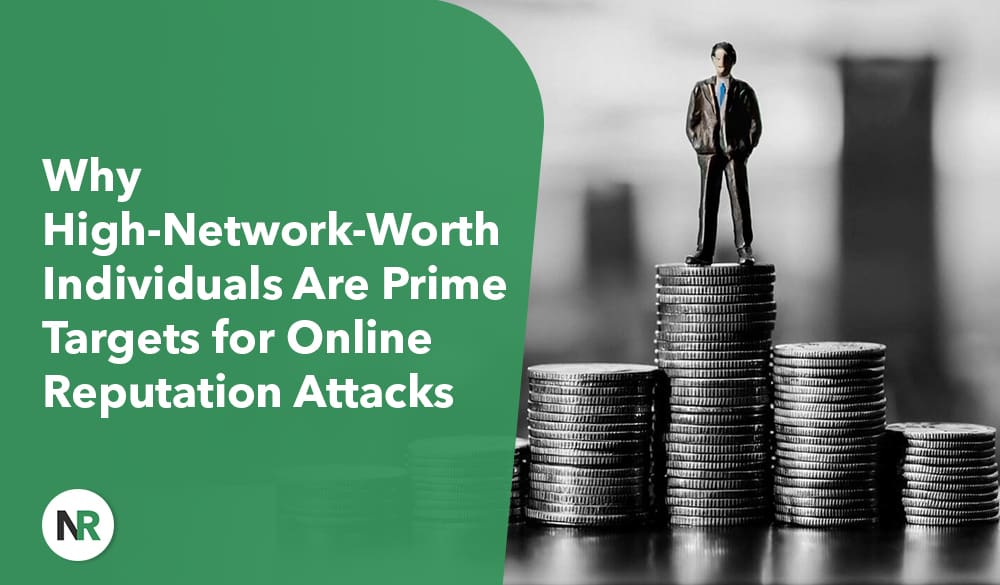Online reputation is a critical asset. It influences how businesses, investors, and customers perceive an individual or company. However, online reputation attacks can quickly damage credibility, affecting personal and professional life.
These threats are amplified for high-net-worth individuals (HNWIs) due to their financial standing and visibility. Negative search results, negative reviews, and damaging content on review sites, social media platforms, and other online platforms can reflect poorly on their professional reputation. The ability to suppress negative content and manage one’s company’s reputation is key to preventing lasting reputational damage.
The Rise of Online Reputation Attacks
Online reputation attacks have become more common, with the internet offering a level playing field where anyone can post content. Most people rely on search engines like Google to gather information about an individual or company, making Google search results a factor in reputation.
A single harmful content post, fake feedback, or negative content can permanently impact a company’s reputation, affecting business deals, partnerships, and even legal standing. Online experience is shaped by various factors, including media coverage, review sites, and social media platforms, which can either build or break a brand.
Understanding these threats is the first step toward implementing strategies to mitigate risk and maintain security online.
Understanding Reputation Attacks
Who Are High-Net-Worth Individuals?
HNWIs are individuals with substantial financial assets. Their wealth and public exposure often make them vulnerable to online reputation attacks, as they are frequently targeted for revenge porn, defamation, or financial extortion.
Why Are They Prime Targets?
Several factors contribute to why HNWIs face reputation attacks:
- Financial Gain – Cybercriminals create negative content or misleading search results to demand payment for removing negative content.
- Revenge or Personal Disputes – Former employees, partners, or rivals may spread false claims that poorly reflect an individual’s professional life.
- Political or Social Influence – Public figures involved in advocacy often become victims of damaging content designed to discredit them.
- Blackmail & Social Engineering – Hackers may steal personal information and threaten exposure unless paid ransom.
The impact of such attacks is far-reaching, affecting business success, personal security, and brand credibility.
Get started with your free reputation evaluation today
Different Types of Online Reputation Attacks
1. Cyberbullying & Defamation
False accusations, smear campaigns, and personal attacks on social media platforms can quickly damage a person’s reputation. Malicious actors may create websites dedicated to spreading negative content.
2. Fake News & Misinformation
Fabricated news articles, AI-generated deepfakes, and misleading social media posts can spread false narratives that poorly reflect someone’s professional reputation.
3. Negative SEO & Search Manipulation
Some competitors or adversaries use negative content and unethical SEO tactics to push damaging content to the top of Google search results. This makes it harder to bury false claims with positive content.
4. False Reviews & Business Smear Campaigns
Fake negative reviews on review sites can mislead potential customers and harm a company’s reputation. Attackers may also manipulate star ratings to make a business appear unreliable.
5. Revenge Porn & Private Data Exposure
Personal data leaks, including intimate photos or confidential business documents, can severely impact professional life. Cybercriminals often use this tactic to extort money or damage someone’s credibility.
The Consequences of Reputation Attacks
How Reputation Damage Affects Personal and Professional Life
Reputation attacks don’t just affect digital presence—they can lead to:
- Loss of Business & Investment Opportunities – Potential partners and customers may hesitate to work with someone with a tarnished reputation.
- Legal & Financial Struggles – Defamation cases can be costly, with long-term legal consequences.
- Emotional & Psychological Toll – Ongoing harassment and harmful content can take a serious toll on mental well-being.
- Permanent Digital Footprint – Even if false content is removed, it may be archived or resurfaced on different websites.
Real-World Example
Consider an entrepreneur falsely accused of fraud. A viral social media post damages their credibility overnight, causing investors to withdraw funding. Even after seeking professional help, the misinformation lingers, affecting their ability to secure new deals.
This highlights why managing an online reputation is necessary, not an option.
How to Protect Your Online Reputation
Being proactive is crucial. Here’s how to address threats before they escalate:
1. Monitor Your Online Presence
- Set up Google Alerts for your name and business to track search results.
- Regularly check review sites and social media platforms for false claims.
- Use reputation management services to track mentions across internet forums.
2. Strengthen Privacy & Security
- Adjust social media privacy settings to limit public access.
- Secure accounts with two-factor authentication and encrypted passwords.
- Remove personal data from websites that expose private details.
3. Develop a Crisis Management Plan
- Have a response strategy for handling negative content.
- Work with PR experts to shape positive content that counters attacks.
- Engage a legal team to file takedown requests or lawsuits against defamatory material.
4. Publish Positive Content to Suppress Negative Content
- Create high-quality articles, interviews, and blog posts to push down damaging content.
- Optimize positive content using SEO to rank higher in search engines.
- Encourage satisfied customers to leave genuine feedback on review sites.
5. Seek Professional Help When Needed
- Seek professional reputation management firms that specialize in removing negative content.
- File complaints with platforms that host defamatory material.
- Contact cybersecurity experts to prevent future attacks on personal and business accounts.
By implementing these strategies, individuals can determine how they are perceived online and safeguard their business success.
Final Thoughts: Take Control of Your Online Reputation
For high-net-worth individuals, reputation isn’t just about image—it directly affects financial stability, business partnerships, and security. A single attack can have long-term consequences, but a proactive approach ensures that one’s online reputation remains intact.
If you’re facing reputation threats, remain calm and take action. Whether you need to suppress negative content, protect Google search results, or improve brand perception, professional solutions exist.
